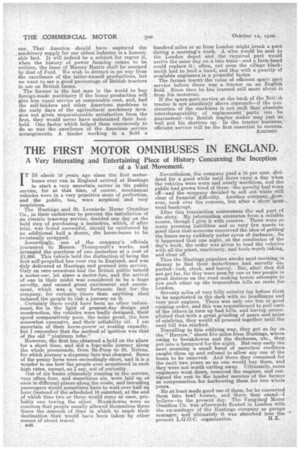THE FIRST MOTOR OMNIBUSES IN ENGLAND.
Page 58

If you've noticed an error in this article please click here to report it so we can fix it.
A Very Interesting and Entertaining Piece of History Concerning the Inception of a Vast Movement
IT IS about 19 years ago since the first motorbuses ever run in England arrived at Hastings to start a very uncertain career in the public service, for at that time, of course, mechanical vehicles were in a very primitive state of perfection, and the public, too, were sceptical and very suspicious. .
The Hastings and St. Leonards Horse Omnibus Co., in their endeavour to prevent the installation of an -electric tramway service, decided one day on the bold step of purchasing a motorbus, which, if after trial, was found successful, should be reinforced by an additional half a dozen, the horse-buses to be
eventually scrapped. .
Accordingly, one of the, company's officials journeyed to Messrs. Thornycroft's works, and arranged the purchase of one motorbus at a cost of £1,000. This vehicle held the distinction of being the first self-propelled bus ever run in England, and was duly delivered at Hastings and pressed into service. Only on rare occasions had the British public beheld a motor-ear, let alone a motor-bus, and the arrival of one in their midst was considered to be a huge novelty, and caused great excitement and amusement, which was a very fortunate fact. for the company, for curiosity (more than anything else) induced the people to risk a journey on it. Certainly there could have been no other inducement, for in the light of present-day design and construction, the vehicles were badly designed, their speed comparatively poor, the noise great, the fare somewhat excessive, and their reliability nil. I am uncertain -of their horse-power or seating capacity, but I remember that the method of ignition was that of the old "platinum tube."
However, the first bus obtained a hold on the place for a short time, and did a foar-mile journey along the whole promenade, from Bo-Peep to St. Helens, for which journey a -sixpenny fare was charged. Some of the penny fares were exceedingly short., and it is a wonder to me how the people ever acquiesced in such high rates, except,-as I say, out of curiosity. Out of six buses ultimately running in the service, very often four, and sometimes six, were laid up at once in different places along the route, and intending passengers Would sometimes have to wait over half an hour (instead of the scheduled 10 minutes), at the end of which time two or three. would -come at once, probably one towing the other. Breakdowns were so common that people usually allowed themselves three times the .amount of time in Which to reach their destination than would have been taken by other means of street travel. , D46 Nevertheless, the company paid a 15 per cent. dividend for a good while until there came a day when the vehicles were worn and nearly worthless, and the public had grown tired of thern—the novelty had worn off—and the company decided to sell out while still clear of financial difficulty. Another -company, ,,however, took over the concern, but after a short span went bankrupt. After this transaction commences --the sad part el the story. My information emanates from a reliable source, though I give it with reserve. There were so many pressing liabilities and so very few assets to meet them that someone conceived the idea of getting the buses away suddenly under cover of darkness. So it happened that one night, at. the conclusion of the day's work, the order was given to load the vehicles with all the 'plant, machinery, and tools worth taking, and clear off.
Thus the Hastings p in
opulace awoke next morng in dismay to find their motorbusee had -secretly des parted—lock, stock, and 'barrel. But, alas! they did not get far, for they were seen by one or two people in great distress on the road making heroic attempts to tow each other up the tremendous hills en route for London. •
Seventy miles of very hilly country lay before them to be negotiated in the dark with no headlamps and very poor engines. There was only one bus in good running order, and this was requisitioned to pull each of the others in turn up bad hills, and having accomplished that with a great grinding of gears and noise of misfiring, they would all proceed together until the next hill was reached.
Travelling in this edifying way, they got as far as. the "Barrow," about five miles from Hastings, where owing to breakdowns and the darkness, etc., they., put into a farmyard for the night.. But-very early the next morning a small band of merciless ereditors_ caught them up and refused to allow any one of the buses to be removed. And there they -remained for the next two years as no one would buy them, and they were not worth carting away. Ultimately, some engineers went down, removed the engines and consigned the rest to the tender mercies of the farmer as compensation for harbouring them for two whole years.
He at least made good use .of them, for he converted them into fowl houses, and there they stand--I believe—to the present day. The Vangualacl Motor Omnibus Co. was afterwards floated in London with the ex-mariager of the Hastings company as garage manager, and ultimately it was absorbed into the "
present L.G.O.C. organization. H. K.




























































